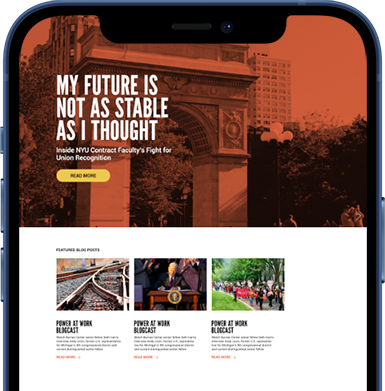The National Labor Relations Act, which governs private-sector labor relations and worker organizing, and state public-employee collective bargaining laws, impose a “duty of fair representation” on unions. This legally enforceable duty requires unions to provide services fairly, impartially, and without ill will or discrimination to every worker in the “bargaining units” they represent (e.g., some or all employees in an office or plant). At a minimum, this includes bargaining with the employer on behalf of all these employees and representing employees who have grievances, including through collectively bargained grievance procedures.
In return for their services, unions ask for a small amount in union dues from their members (typically less than 2% of pay) and in some cases “fair share” fees, also known as “agency fees,” from non-members. These fees pay the union’s costs that make their representation possible, like legal services, rental of meeting spaces, communicating with employees, paying salaries, and so on. The money may also fund organizing more employees so the union and its members will gain more power in their dealings with their employers.
Of course, these laws have nothing whatsoever to do with a right to work. No U.S. state guarantees its residents jobs, as these laws suggest they will. The name is a fraud. Rather, they are best described as right-to-freeload laws.
To enforce the collection of these dues or fees, unions in about half the states can bargain for a “union security clause ” in their collective bargaining agreements that requires either union membership, and therefore dues, or equivalent fair share fees. In 27 states, however, union security clauses are unenforceable because those states have enacted so-called “right-to-work” laws. Of course, these laws have nothing whatsoever to do with a right to work. No U.S. state guarantees its residents jobs, as these laws suggest they will. The name is a fraud. Rather, they are best described as right-to-freeload laws. They are cheat-your-neighbor laws. They allow workers to take from their unions and the co-workers who finance them and give nothing back. Nothing.
The newly elected Democratic majority in the Michigan legislature appears poised to repeal their state’s right-to-free-ride law. They certainly should. Other states should, as well. The goal of these laws is not better functioning and freer labor markets, like the Federal Trade Commission’s proposed ban on non-compete agreements. Instead, the goal is to weaken unions’ finances, drive down union membership, and reduce wages for working people, especially but not exclusively union members. Recent studies show that right-to-freeload laws are destructive in precisely these ways: reducing union membership, weakening unions’ efforts to narrow income inequality , and driving down union members’ and other workers’ wages.
Ultimately, the question raised by right-to-freeload laws is not exclusively economic. It is also ethical. How should we treat one another? Do we want a society in which we favor those who take advantage of their co-workers and neighbors? Or do we want a society in which everyone pays their fair share for the benefits and privileges they receive?
If you have ever grown angry because you learned that someone else got an unfair tax break (or cheated on their taxes), or received favored treatment they didn’t need or deserve, or refused to contribute when your community was trying to come together to solve its problems, then these right-to-freeload laws should infuriate you. Some in our society genuinely need free services, the community’s help, and a robust safety net of support. We should provide those things to those who need them. That’s not what right-to-freeload laws provide.
We can do better. And starting in Michigan this year, hopefully, we will.

